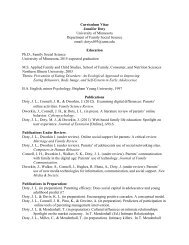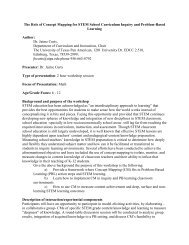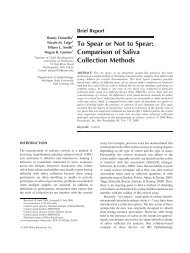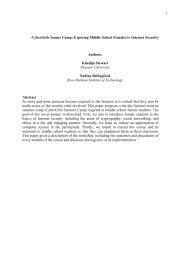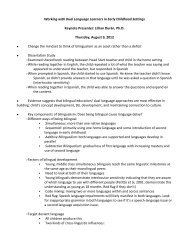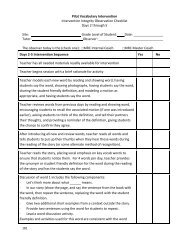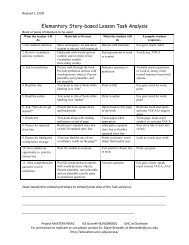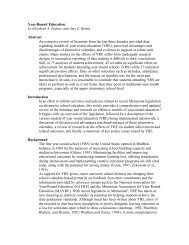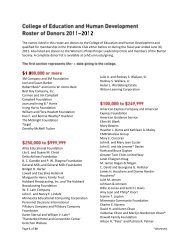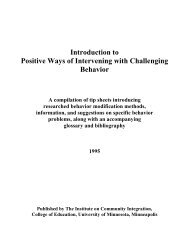Trauma and the Developing Brain - College of Education & Human ...
Trauma and the Developing Brain - College of Education & Human ...
Trauma and the Developing Brain - College of Education & Human ...
You also want an ePaper? Increase the reach of your titles
YUMPU automatically turns print PDFs into web optimized ePapers that Google loves.
Nov. 19, 2007<br />
H<strong>and</strong>out for <strong>Trauma</strong>, The <strong>Developing</strong> <strong>Brain</strong>, Healing <strong>and</strong> Emotional Regulation Seminars<br />
Karina A. Forrest-‐Perkins MHR LADC, 2011<br />
process <strong>and</strong> master that experience. The inability to control elements <strong>of</strong> <strong>the</strong> traumatic event, or<br />
<strong>the</strong> intrusive thoughts that follow, lead to a set <strong>of</strong> predictable mental <strong>and</strong> physiological<br />
responses.<br />
<strong>Trauma</strong> may alter <strong>the</strong> stress response, even in healthy people, Cornell study shows<br />
By Susan Lang<br />
Researchers have known for years that psychological trauma that results in post-‐traumatic stress disorder (PTSD)<br />
or depression can change how a person responds to stress. Now, Cornell researchers report that rapes, sudden<br />
deaths <strong>of</strong> loved ones, life-‐threatening accidents <strong>and</strong> o<strong>the</strong>r such traumas may result in long-‐term changes even if<br />
<strong>the</strong> survivor doesn't develop a clinical disorder.<br />
"The findings suggest that <strong>the</strong>re may be persistent differences in <strong>the</strong> stress response in some trauma-‐exposed<br />
people, even if <strong>the</strong>y do not exhibit PTSD or depression or both, <strong>and</strong> even if <strong>the</strong>ir trauma was years in <strong>the</strong> past,"<br />
said Barbara Ganzel, Cornell M.S. '99, Ph.D. '02, a lecturer in human development in Cornell's <strong>College</strong> <strong>of</strong> <strong>Human</strong><br />
Ecology.<br />
Ganzel led a team <strong>of</strong> Cornell researchers, whose study is published in a special issue <strong>of</strong> <strong>the</strong> Journal <strong>of</strong> <strong>Trauma</strong>tic<br />
Stress on <strong>the</strong> biology <strong>of</strong> trauma. They assessed a group <strong>of</strong> women before <strong>and</strong> after <strong>the</strong>y took <strong>the</strong>ir medical<br />
admissions tests (MCATs), a stressful experience for most people. Measuring levels <strong>of</strong> a stress hormone in saliva<br />
(cortisol), <strong>the</strong>y found that women who had experienced trauma earlier in life (but who did not have PTSD or<br />
major depression) had lower levels cortisol leading up to <strong>and</strong> after <strong>the</strong> MCAT exam.<br />
In addition, <strong>the</strong>y found that <strong>the</strong> women who had experienced trauma kept a negative mood after <strong>the</strong> test,<br />
compared with o<strong>the</strong>r women, whose moods lifted significantly after <strong>the</strong> exams.<br />
Ganzel suspects that <strong>the</strong> stress response system in <strong>the</strong>se women have compensated or changed over time. The<br />
trauma-‐exposed women showed lower ra<strong>the</strong>r than higher levels <strong>of</strong> cortisol, Ganzel <strong>the</strong>orized, because "stress<br />
initially boosts cortisol output but after <strong>the</strong> stressor is over, cortisol falls below normal. These data suggest that,<br />
in some people, it may fall below normal <strong>and</strong> stay <strong>the</strong>re, or that it develops a chronic tendency to dip lower than<br />
normal under stress."<br />
The o<strong>the</strong>r co-‐authors are John Eckenrode, Pilyoung Kim, Elaine Wethington, all in human development at Cornell;<br />
25



